CONTENTS
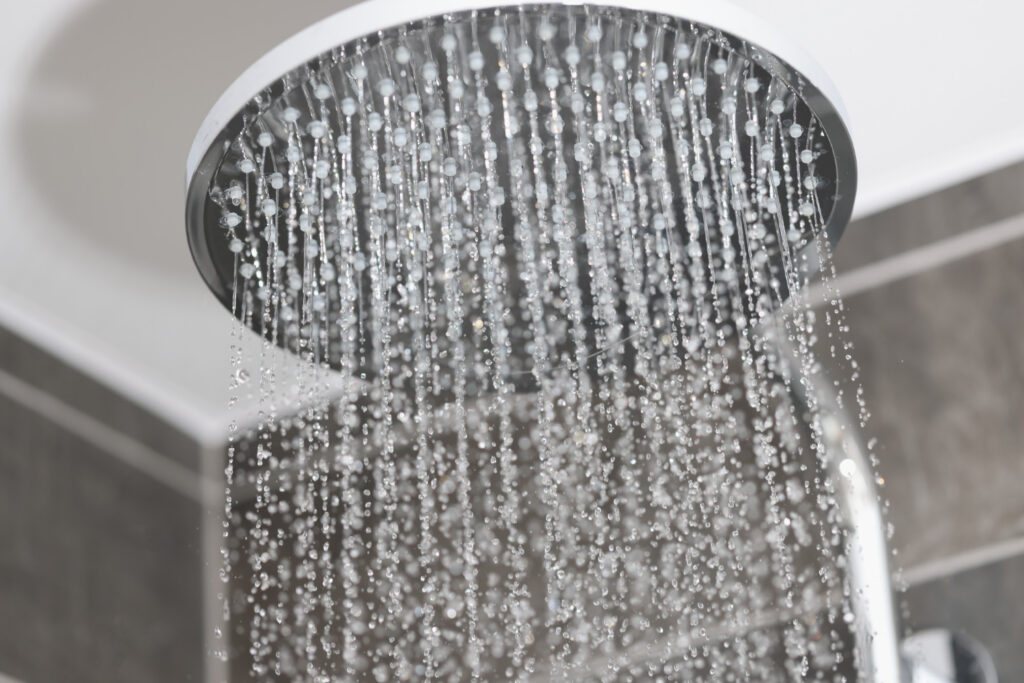
Chilling Out: Do Cold Showers Help Acne?
Are you plagued by acne and looking for a cost-effective solution? If so, you may have heard of the claimed miraculous benefits of cold showers. But do cold showers help with acne?
Many people swear by taking cold showers to improve their skin health. But is there any scientific proof to back up this claim? Let’s explore the potential effects cold showers can have on your complexion!
Cold Water and Skin
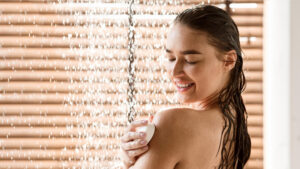
Cold water is known to be beneficial to the skin in many ways. Not only does it help maintain hydration and improve skin elasticity, but can also reduce inflammation and make a difference in treating breakouts such as acne.
Additionally, cold water increases blood circulation and can make the complexion look brighter while tightening pores and reducing puffiness around the eyes.
All of this combined shows that cold water is an excellent alternative to hot water and is an effective way to maintain healthy skin.
Advantages of Cold Showers for Acne
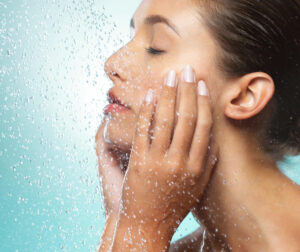
While there is limited scientific evidence on the direct health benefits of cold showers for acne, some studies suggest that cold showers may have certain advantages for the skin that could potentially improve acne symptoms.
Here are a few possible benefits of cold showers for acne:
- Reduced inflammation: Cold water can help reduce skin inflammation by constricting blood vessels and reducing blood flow to the affected areas. This may help to reduce the redness and swelling associated with acne.
- Improved circulation: Cold water can also increase circulation and stimulate the lymphatic system, which can help flush out toxins and waste products. This may help to improve overall skin health and reduce the likelihood of developing acne.
- Tightened pores: Cold water tightens pores, which can help to reduce the number of natural oils produced by the skin. Excess sebum production can cause clogged pores and contribute to the development of acne.
- Increased alertness and energy: Taking a cold shower can also help to increase alertness and energy levels, which may help to reduce stress and improve mood.
While cold showers may not be a magic cure for acne, they could be a useful addition to a holistic skincare routine that includes other healthy habits, such as a balanced diet, regular exercise, and stress management.
Disadvantages of Cold Showers for Acne
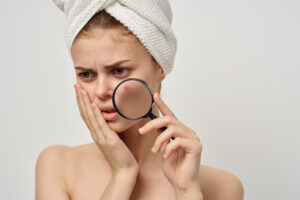
While cold showers may have some potential benefits for acne-prone skin, they may also have several disadvantages that you should be aware of, including:
- Drying out the skin: Cold water can be very drying for the skin, especially if you take long, cold showers frequently. Over time, this can make flaky, irritated skin more susceptible to acne and other skin conditions.
- Irritating sensitive skin: Some people with sensitive skin may find that cold water is too harsh and can worsen their acne symptoms.
- Triggering cold urticaria: Cold showers can trigger a condition known as cold urticaria, which causes hives, itching, and swelling in response to cold temperatures. If you experience these symptoms after a cold shower, you should stop immediately and consult a doctor.
- Discomfort and difficulty adapting: Cold showers can be uncomfortable, and some people may find it challenging to adjust to the sudden change in temperature. This can lead to decreased motivation to take a shower, which can lead to inadequate hygiene.
- No direct evidence on acne improvement: While some studies suggest that cold showers may benefit the skin, there is limited direct evidence on the effects of cold showers on acne.
Overall, while cold showers may benefit acne-prone skin, they may not be suitable for everyone, and you should consider their potential disadvantages. It’s essential to listen to your body and consult with a healthcare professional if there are any concerns or underlying medical conditions that may be affected by cold showers.
Types of Cold Showers To Try
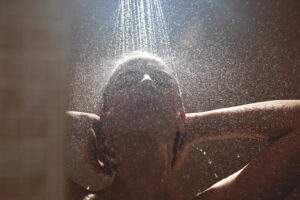
If you’re considering trying out cold showering as part of your skincare routine, there are various types to explore, including:
- Gradual cooling: Start with lukewarm water or warm water, and gradually decrease the temperature until it becomes cold. This method can help your body adjust to the cold temperature more efficiently.
- Contrast showers: Alternate between a cold and hot shower for brief periods. For instance, begin with hot showers for 1-2 minutes, then switch to cold water for 30 seconds to 1 minute, and repeat several times.
- Cold immersion: Stand under a cold shower for several minutes, focusing on deep breathing and relaxation. You can also try immersing yourself in a cold bath or shower for a few minutes.
- Wim Hof method: This approach involves breathing exercises and gradual exposure to cold water to enhance mental and physical well-being. The technique can be intense and should be done under supervision.
- Quick cold blast: At the end of your usual warm shower, switch the water to cold for 30 seconds to a minute. This can help stimulate circulation and tighten pores.
Remember to listen to your body and start slowly if you’re new to cold showers.
Eliminating Other Factors That Could Impact Your Acne
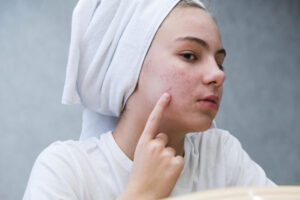
If you’re looking to improve your acne, there are several things you can do besides taking cold showers. Here are some additional tips:
- Keep your skin clean: Wash your face twice daily with a gentle cleanser to remove excess oil and dirt. Proceed to have a proper skincare routine afterward.
- Avoid picking or squeezing pimples: This can lead to scarring and further breakouts.
- Moisturize: Even if you have oily skin, using a non-comedogenic moisturizer is essential to keep your skin hydrated and healthy.
- Use acne-fighting products: Look for products that contain benzoyl peroxide, salicylic acid, or alpha hydroxy acids, which can help fight acne.
- Limit sun exposure: Overexposure to the sun can cause skin damage and worsen acne. Use sunscreen with at least SPF 30 when going outside.
- Get enough sleep: Lack of sleep can increase stress and worsen acne. Sleep for 7-8 hours per night.
- Drink plenty of water: Staying hydrated can help clear your body of toxins and keep your skin healthy.
Frequently Asked Questions
How often should I take cold showers to see an improvement in my acne?
To see an improvement in acne with cold showers, start slowly and gradually increase frequency over time. Some people may see results with just a few cold showers per week, while others need them daily. On average, you can do it two to three times a week.
Are there any risks or side effects of taking cold showers for acne?
While cold showers can be helpful for acne, there are risks and side effects to keep in mind. Cold showers may worsen skin conditions like eczema or psoriasis and cause vasoconstriction, leading to dry skin and irritation.
Conclusion
All in all, cold water is beneficial for the skin in many ways, especially for acne-prone skin. Some potential benefits of cold showers for acne include reduced inflammation, improved circulation, and tightened pores.
However, there are also several downsides to cold showers. Therefore, remember to listen to your body and start slowly if you’re new to cold showers. Plus, don’t forget to eliminate other factors that can impact your acne.
So, are you interested in trying cold showers to treat your acne?


